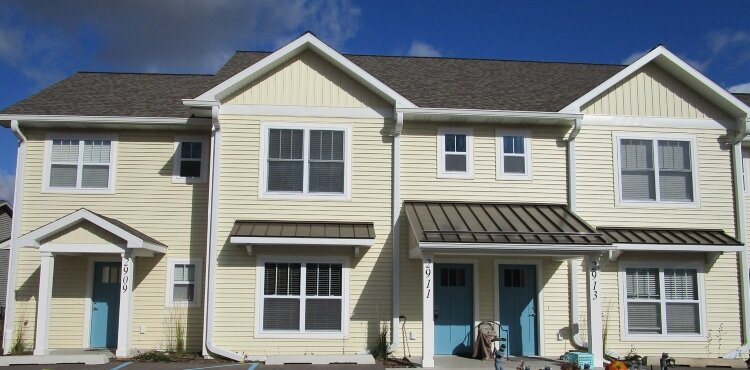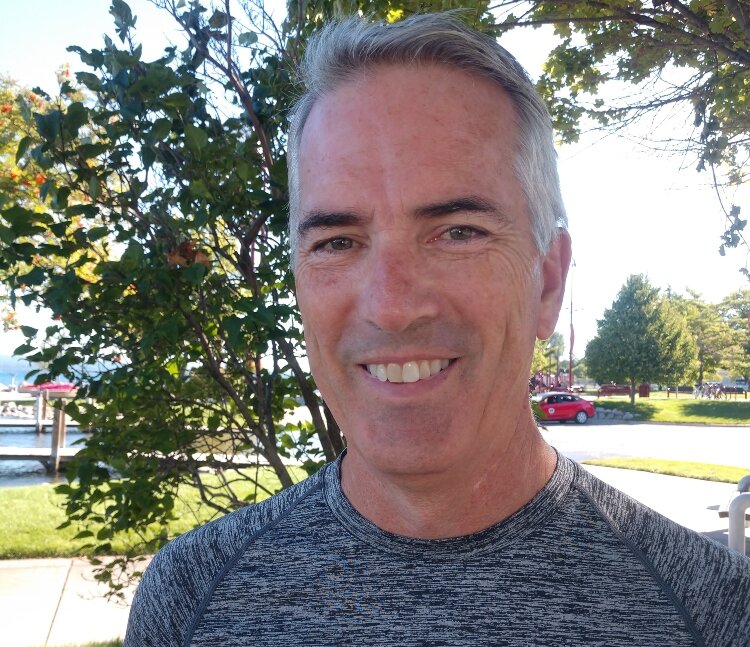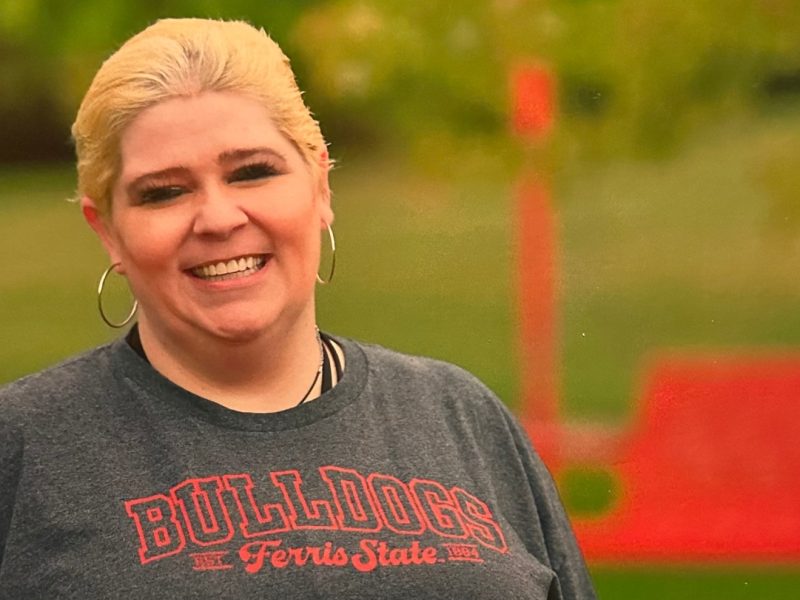Capital for Compassion works to enable homeless to ‘live a more gracious life’
Capital for Compassion comes alongside Lakeshore nonprofits as they strive to provide affordable housing and shelter for the homeless. The Holland company wades through complex funding regulations to ensure they have the resources to carry out that mission.
Cheri Litvack is among those Lakeshore residents who have withstood the headwinds of homelessness.
Credit for having a roof over her head goes in part to Holland-based Capital for Compassion, which adeptly wades through the complex federal regulations required so nonprofits can access tax credits and affordable housing grants that help fund their developmental projects.
Founded in 2004 by Kevin Foster, Capital for Compassion has consulted on more than 295 projects nationwide valued at $1.05 billion in property development, including West Michigan projects valued at more than $39 million, while obtaining more than $262 million in funding nationwide for organizations that provide affordable housing.
Lakeshore nonprofits that partner with Capital for Compassion include Holland Rescue Mission, Third Coast Homes, Parkview Adult Foster Care Home in Zeeland, and Muskegon Rescue Mission.
“The Holland Rescue Mission has a continuum of housing services: emergency shelter, recovery housing, transitional housing, and intern housing,” says Foster, who serves as Capital for Compassion’s Managing Partner. “So, even though it has the name ‘rescue mission,’ it is fielding a broader array of housing. One of our funders has a very broad definition of affordable housing, and we have been able to use its funding on a wider scale, including recovery program housing and adult foster care housing.”
Path to homelessness
Litvack is grateful to be counted among those who have an affordable place to live.

She became homeless in 2017, when her marriage of 36 years ended. Litvack’s husband divorced her and cashed out on a trust worth almost $800,000 that was directly deposited to his account, leaving Litvack with unpaid back property taxes, as well as a second mortgage she was unaware of.
Once the home was sold and the property taxes paid, there was little cash left and, for the first time in her life, Litvack was without a place to live.
Earlier that year, the 59-year-old Holland resident suffered a spinal injury when a motorcycle sideswiped a moped she was driving, “shattering” her spine.
“It’s been a very long journey,” Litvack acknowledges. “I lost basically everything. I was in a bad place. All I could do is try to focus on someplace to live.”
Homeless in California
Capital for Compassion was a long journey for Foster as well, saying he “stumbled into” launching the company.
Foster unexpectedly found himself homeless while living in Southern California. A torrential rainfall in 1993 produced a landslide that decimated his home. His insurance policy did not cover landslides, so Foster relocated to Holland, where housing costs are more affordable.
Eventually, Foster met Darryl Bartlett, executive director of Holland Rescue Mission, and started volunteering there.
“I really liked their approach, which was they were offering a hand up and not a handout,” Foster says. “You had to find a job, had to reach goals. I started volunteering and donating. In 2003, Darryl Bartlett asked me to write a grant proposal for them. I never wrote a grant. I spent three long weeks writing a grant approval for $293,000.
Things started percolating from there, and Foster eventually created Capital for Compassion.
Third Coast Homes
A recent development Capital for Compassion helped birthed into reality is a four-unit block of transitional townhomes in Holland Township, called Third Coast Homes, where Litvack is a tenant.

Tenants first occupied the townhomes in February 2019, with an eye on breaking the cycle of poverty, thanks to a partnership between Good Samaritan Ministries and Lakeshore Habitat for Humanity, both in Holland. Families living in the townhomes pay no more than 30% of their income toward living expenses, and tenants can live there indefinitely.
“Our goal is to help move people along toward greater thriving, which may lead to home ownership, but we have no cap on how long someone can live there,” says Drew Peirce, executive director of Good Samaritan Ministries.
“Our tagline is to build a more gracious future,” Foster says. “We want to help our customers (nonprofits), the down and out, and working poor, live a more gracious life. They are trying to get ahead but lost a job or got a medical bill that upsets their whole housing situation. We work with organizations to get people off the street, and into transitional and permanent housing. We work with organizations that work with the homeless so they can become homeowners, and that can take anywhere from four to 10 years.”
Fee varies
Foster says Capital for Compassion charges its partners a varying fee.
“The amount of fees vary, depending on the funding components pursued,” he says. “We typically charge a retainer at the start of the work, with all remaining fees based upon successfully obtaining funds. Fees can average from 3.5% to 7.5% of the awarded funds depending on the amount of services and project size.
The effort is worth it, according to Foster. Affordable rent allows people to keep a larger portion of their paycheck for savings, and to afford day care, health care, and reliable transportation. Owning a home builds equity and creates financial security, he says.
Moving toward home ownership
Conversely, inaccessible housing requires longer commutes to work, results in poor health outcomes due to the need to pay out-of-pocket expenses, makes healthy food less affordable, disrupts children’s education due to frequent moves, and forgoes essentials because of the high cost of child care.
“When we started the project (Third Coast), we just wanted people to know that Good Samaritan and Lakeshore Habitat were collaborating, so it was used for marketing to show the partnership,” says Don Wilkinson, executive director for Lakeshore Habitat for Humanity.
Good Samaritan serves as Third Coast’s property manager and provider of supportive services, which includes individual case management, matching low-income people with services to achieve their goals, budgeting, and help with income growth. Lakeshore Habitat steps in when tenants are ready to shift from transitional housing to home ownership.
“We want to help people make the necessary steps to become a Lakeshore Habitat family,” Wilkinson says. “The partnership with Good Samaritan is to move from a cycle of generational poverty to be more of an asset to the community.”
Contractor hired
Constructing the Third Coast townhouses would have likely taken double the time if Lakeshore Habitat had to rely on volunteer labor to complete its projects, as it typically does. But this development was able to hire a general contractor because of the money it garnered through the federal affordable housing program.
“Lakeshore Habitat only uses volunteer labor, but we were able to hire GDK as a general contractor to do it for us,” Wilkinson says. “We rent to tenants that only have to pay 30% of their income. So if they only make $20,000 then their rent income is only 30% of that annually. And so it really opened up the opportunity to be able to help people who normally couldn’t afford it. I think the average rental around Holland is $1,000 to $1,200 a month.”
‘Walked us through the process’
Wilkinson adds neither Lakeshore Habitat nor Good Samaritan knew the complexities of applying for a federal affordable housing grant. Capital for Compassion did.
“There are so many interconnected parts; we wouldn’t know what to look for,” Wilkinson says.
“The total cost of that project was $967,551, and Capital for Compassion walked us through the process all the way until the end,” Wilkinson recalls. “We received a grant and, because of that, it allowed Lakeshore Habitat and Good Samaritan to only have to raise about $250,000 and be able to build the project in about half the time it would have taken us to normally build it.”
And for that, Litvack is grateful.
“There are four families who live here,” she says. “We all came from a situation that really devastated every one of us. Each of our stories is different, but the ending is the same.”
Read more stories about efforts to address Ottawa County’s housing issues:
Renters avoid eviction, landlords get back rent with new state program
Nonprofits join forces to tackle affordable housing shortage in Ottawa County
Foundation’s $1.5 million investment targets creation of workforce housing
How collaboration is growing affordable housing in Ottawa County
One vision for adding affordable housing to downtown Holland
From homeless to helping: Holland leader shares his Habitat story
How volunteering helped turn a homeless man’s life around
Emergency housing programs ‘saved my family,’ mom says
Mission takes extra steps to protect homeless from COVID-19
Being homeless during the COVID-19 crisis









